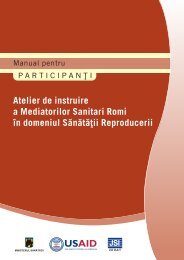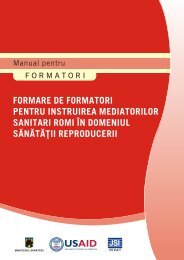Training of Roma Health Mediators in Reproductive Health
Training of Roma Health Mediators in Reproductive Health
Training of Roma Health Mediators in Reproductive Health
Create successful ePaper yourself
Turn your PDF publications into a flip-book with our unique Google optimized e-Paper software.
o Note next to each <strong>of</strong> their responses to the woman any <strong>of</strong> the types <strong>of</strong> obstacles<br />
just presented (<strong>in</strong> other words, note if any <strong>of</strong> their responses to these women<br />
could be classified as obstacles to communication).<br />
• Ask several volunteers to share examples <strong>of</strong> their responses.<br />
Summary<br />
Assist the group to summarize their learn<strong>in</strong>g, us<strong>in</strong>g the follow<strong>in</strong>g questions:<br />
‣ How did you feel:<br />
Respond<strong>in</strong>g to these women?<br />
Review<strong>in</strong>g your responses to see how you had responded to the women and their<br />
possible reactions?<br />
‣ Th<strong>in</strong>k about your reactions and responses dur<strong>in</strong>g the exercise and about why you<br />
responded as you did. Do you th<strong>in</strong>k you heard and understood all that the woman<br />
wanted to say (<strong>in</strong>clud<strong>in</strong>g what was beh<strong>in</strong>d what she said) and if not, why?<br />
‣ If you were to hear these statements aga<strong>in</strong>, would you react differently?<br />
‣ Do you get a second chance to respond more appropriately to a woman if you have<br />
responded <strong>in</strong>appropriately the first time?<br />
Maybe yes, maybe no. In general, the mediator’s first response has an impact, positive or<br />
negative depend<strong>in</strong>g upon the response, on the woman’s perception <strong>of</strong> her. If the mediator<br />
responded poorly, she may be able to re-establish a more positive relationship with the<br />
woman by apologiz<strong>in</strong>g for her response and respond<strong>in</strong>g more appropriately afterward.<br />
‣ How can you be more prepared to respond <strong>in</strong> such difficult situations?<br />
• By recogniz<strong>in</strong>g that the problem presented by the woman belongs to her.<br />
• By apply<strong>in</strong>g the problem-solv<strong>in</strong>g model (discussed <strong>in</strong> Session 13), and remember<strong>in</strong>g<br />
that our job is to help the woman to work through this process by ask<strong>in</strong>g questions<br />
and provid<strong>in</strong>g <strong>in</strong>formation as needed.<br />
Expla<strong>in</strong> that:<br />
• All <strong>of</strong> the responses are normal. We have learned to respond <strong>in</strong> these ways, usually<br />
with the <strong>in</strong>tent <strong>of</strong> help<strong>in</strong>g the person.<br />
• There are occasions when certa<strong>in</strong> <strong>of</strong> these responses are appropriate.<br />
• These responses may block communication, however, when they hurt the <strong>in</strong>dividual<br />
or cause resistance or hostility toward us or to what we are try<strong>in</strong>g to expla<strong>in</strong>.<br />
207<br />
RFHI/JSI <strong>Roma</strong>nia <strong>Tra<strong>in</strong><strong>in</strong>g</strong> <strong>of</strong> RHMs <strong>in</strong> <strong>Reproductive</strong> <strong>Health</strong> Session 14: Interpersonal Communication








